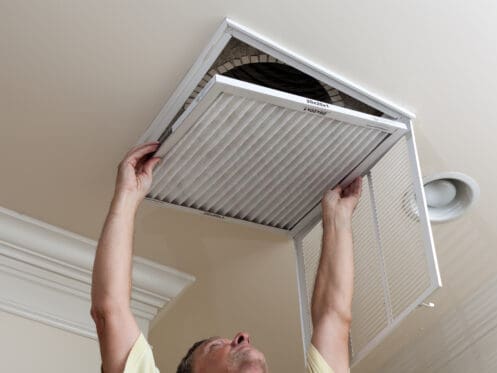Air filters are an essential part of all HVAC systems. They work to protect the system from damage and improve indoor air quality. Using the right filter in your HVAC system is also important for ensuring it works efficiently and heats and cools effectively. The problem is that it can be difficult to know which filter you should use. That’s why we’ve created this guide that will explain all you need to know about HVAC air filters and why some are better than others.
Different Types of Air Filters
Most HVAC systems are designed to use a standard 1-inch filter. However, many people choose to upgrade their HVAC system with a media filter. This type of filter is much thicker and far more effective at eliminating airborne particles and contaminants. It is designed to be used in place of a standard air filter. Another difference is that 1-inch air filters need to be replaced every 30 to 90 days. The media filter in an air cleaner typically lasts for a full year or more.
Standard air filters are typically made of metal or fiberglass mesh. These are usually the least expensive type of filter but also the least efficient. Pleated air filters are a more effective option. This is because the pleats increase the surface area of the filter, which allows it to trap many more particles as the air flows through it.
Media filters are also made of pleated materials that are tightly compressed. If you were to stretch a media filter out, the materials would measure around 75 square feet. This means that media filters have a huge surface area, which is why they work so much more efficiently to remove particulates.
Most air filters are essentially just a physical barrier that prevents particles from flowing through them. However, there are also electrostatic filters that work differently. Instead of simply acting as a barrier, electrostatic filters use static electricity to attract and capture any particles in the air that are flowing through them. While this can make them more efficient, the efficiency of many electrostatic filters isn’t much different than that of a high-quality pleated filter.
Air Filter Efficiency Ratings
Air filters are rated based on how efficiently they work. These ratings are determined by testing the air filters to see the percentage of differently sized particles the filter can trap. The most basic, lower-rated filters are fairly efficient at trapping larger airborne particles like dust and dander. However, the vast majority of smaller particles will pass straight through the filter. This includes allergens like mold spores, pollen, and dust mites, as well as smoke, bacteria, viruses, and airborne chemical compounds. The higher the air filter rating, the more efficient it is at trapping even the tiniest airborne particles. The most efficient, highest-rated filters will trap more than 99% of particles down to 0.1 microns in size.
The MERV (Minimum Efficiency Reporting Value) scale is used to rate the efficiency of air filters. This scale starts at MERV 1, which is the least efficient, and goes up to MERV 20. All filters between MERV 16 and MERV 20 are considered HEPA (High-Efficiency Performance) filters and are used in environments that must be extremely clean and sanitary.
Most standard 1-inch filters designed for residential HVAC systems are between MERV 5 and 13. Commercial and industrial air filters typically have higher MERV ratings because these systems are larger and more powerful. The reason that there aren’t higher MERV filters for residential systems has to do with airflow restrictions. The more efficient a filter is, the more restrictive it is in terms of airflow. This means that it takes much more force to draw air through the filter.
Using a filter that is too restrictive is essentially the same as running the system with a filter that is extremely dirty and clogged. Residential blowers are only so powerful. This means that if the filter is clogged or too restrictive, the blower will struggle to draw a sufficient volume of air through it. As a result, the HVAC system will work much less effectively and be less efficient. A dirty or restrictive filter will also often lead to a furnace frequently overheating or an AC system freezing up fairly often. This is simply because there will be far less cool or warm air flowing into the HVAC system.
Why Choosing the Right Filter Is Important
The main role of an air filter is to keep dust and debris out of the central part of the HVAC system. This includes the part of the furnace where the heat exchanger, evaporator coil, and air handler are located. If a system doesn’t have a filter, a huge amount of dust and debris will get inside and clog the system up. This will make the system much less effective since all of the debris will prevent the blower from working properly and circulating air. If the evaporator coil gets coated in dust, it will prevent the AC system from pulling as much heat out of the air. This will also make the system cool less effectively, which can lead to the coil freezing.
While the air filter primarily helps an HVAC system work as effectively as possible, it can also make a difference in your home’s air quality. However, this depends on how efficient the filter is. Less efficient filters can’t trap a lot of allergens and airborne pollutants. This means that if air quality is a concern, you should always choose a more efficient filter with a higher MERV rating.
Choosing too high of a MERV rating can be a problem. High-efficiency filters can be too restrictive. This added restriction usually means that HVAC equipment should have additional power or equipment in order to prevent interference with air flow.
However, there are some air cleaners that provide air filtration with almost no noticeable reduction in airflow. This allows them to be installed in place of a standard air filter, which definitely isn’t the case with all products. Another good option is to install an electronic air cleaner, as this type of unit will provide extremely effective filtration with zero restriction in airflow.
At First Choice Plumbing, Heating & Air Conditioning, we’ve been helping customers in Metuchen and the surrounding areas with their heating, air conditioning, and indoor air quality for over two decades. As the area’s top indoor air quality specialist, we’re ready to help with your air purification, ventilation, and filtration needs. We carry a selection of high-quality, efficient indoor air quality units for any size home. If you have issues with high humidity in your home, we offer humidity control products, including energy-efficient whole-home dehumidifiers. Our NATE-certified technicians are also highly experienced in HVAC repairs, maintenance, and new unit installation. Our expert plumbers can also help if you need any plumbing repairs or maintenance.
For more information on the different options that are available for air filtration and purification, contact First Choice Plumbing, Heating & Air Conditioning today.




